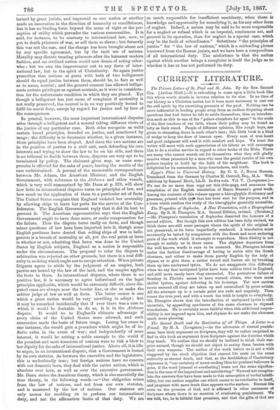ment base their argument on Scripttme, they will be rather
surprised to
find in this book an argument from Scripture against the doctrine which they teach. We confess that we should be inclined to think their sur- prise natural, though we should not object to seeing them beaten with their own weapons. The author of the work before us is not a whit staggered by the stock objection that eternal life rests on the same
authority as eternal death, and that, as the Archbishop of Canterbury expresses it, "oar certainty of never-ending bliss for penitent believers is gone, if the word [eternal or everlasting] bears not the same significa- tion in the case of the impenitent and unbelieving." We need not recapitu- late the answers that have been made to this assumption of verbal infalli- bility, but our author supplies one which seems to us conclusive in itself, and pregnant with more truth than appears on the surface. Eternal life rests on the promise of God, and is affirmed in other sentences of Scripture where there is no mention of everlasting punishment. We are told, too, he is faithful that promises, and that the gifts of God are
without repentance. But there is nothing to show that threats and judgments cannot be recalled, or that if God does not execute the sentence denounced on the wicked the grace accorded to believers must also fail. We commend to those who talk of the blessedness of belief in hell the passages quoted by our author from St. Angastine about the damnation of babes, and from St. Thomas Aquinas and Peter Lombard about the joy with which the blessed in heaven gaze on the unspeakable sufferings of the wicked. If that is a moral doctrine, there is an end of all general principles of humanity, to leave Christian principles out of the question.































 Previous page
Previous page